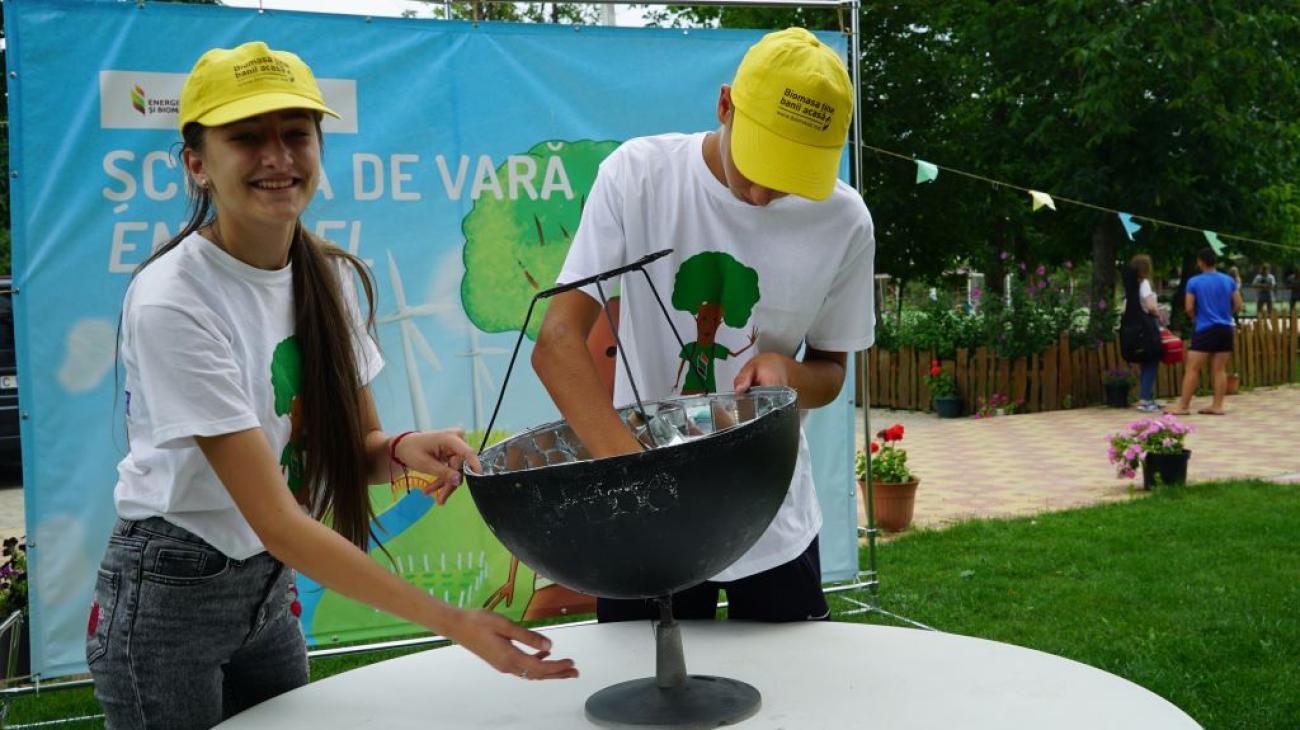The sun, wind and water – allies of the Moldovan young eco inventors

In recent years, dozens of Moldovan young people developed systems that offer cheap and effective solutions to environmental problems
In recent years, dozens of Moldovan young people developed systems that offer cheap and effective solutions to environmental problems, thanks to the educational initiatives launched by the EU-funded Energy and Biomass Project, and implemented by UNDP.
Andrei and Madalina Jitari are cousins, study in the same class and, for some time, they share the same passion for renewable energy sources. In their free time the teenagers, who are now in the 9th grade, built the model of an eco-bus stop, well-lit by solar energy. The idea was born out of the problem faced by the people in their village – Falestii-Noi, Falesti district. None of the three bus stops is illuminated, and those who leave early to go to the city or come back late in the evening can get hurt in the dark.
It took a few weeks to design the model and build it out of organic glass pieces and metal rods.
“The operating mechanism is simple – photovoltaic lamps store the solar energy in a solar battery, and at night – it lights up,” says Andrei.
The two students insist for their project to be applied in practice, so they presented it to the mayor and local councilors. Adults were convinced by their arguments and promised them that in a few months they will find necessary money to transform the bus stops of the village according to the model proposed by the kids.
That promise made them enthusiastic, so they are already working on a new plan. They will suggest the mayor to use lighting based on solar energy in other places in the village as well: park, playground, stadium.
In May 2018 the project developed by Madalina and Andrei Jitari received a mention in the National Contest on Renewable Energy, hosted by the Ministry of Education, Culture and Research in partnership with the Moldova Energy and Biomass Project. The young people received a cash prize and tickets to the ENERGEL Summer School, which reached its seventh edition and gathers teenagers passionate about renewable energy sources across the republic.
Pieces of mirror and an old globe can be turned into an.... oven where food is cooked and which saves money on bills. The idea belongs to Speranta Minciuna and Maxim Galca from Verejeni village, Ocnita district.
In order to build the mechanism they „cut” in two an old metal globe left from geography lessons, covered the concave shape with pieces of a broken mirror, and on top of it fixed a few iron rods as a frying pan support. The device captures the sunlight and heats the metal surface of the frying pan, so that the food can be heated, and in the sunny days even cooked, children say.
They tested the invention several times, and during an excursion they offered their classmates potatoes fried in ... the sun.
”The teacher tells us that solar energy is free and we must use it. We tried to use it in our everyday activity to reduce expenses and, at the same time, to protect the nature,” says Speranta.
The technology has won a special prize in the National Contest on Renewable Energy, and Maxim and Speranta had the opportunity to have fun and rest at the ENERGEL summer school, along with other green energy fans.
51 young people from several districts attended this year’s edition of the ENERGEL summer school, held between 2 and 11 July, in Slobozia-Dusca, Criuleni district. Students learned to save energy, recycle waste, and one day they taught the people in the host village how to sort out the garbage. At the same time, teenagers had thematic workshops where they built their own models of equipment that generate renewable energy and came up with innovative solutions to environmental problems. ENERGEL summer school is part of the educational initiative for the promotion of renewable energy and energy efficiency launched by the Moldova Energy and Biomass Project in communities that installed biomass heating systems. Until now, over 24,000 children studied the renewable energy and energy efficiency course in schools, and more than 500 took part in the ENERGEL Summer School.
The Energy and Biomass Project, phase two, is a project carried out in 2015-2018, with a total budget of Euro 9.41 million provided by the European Union and is implemented by the United Nations Development Programme. It continues the first phase of the project (2011-2014), with a total budget of Euro 14,56 million offered by the European Union (Euro 14 million) and UNDP (Euro 560,000). The national partner of the Energy and Biomass Project is the Ministry of Economy and Infrastructure.


